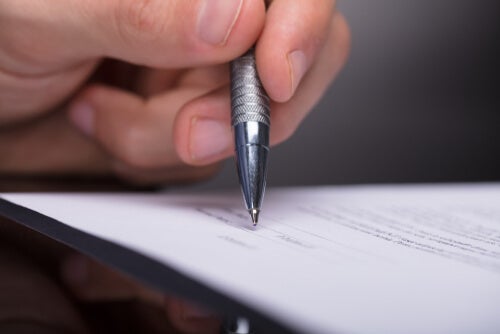The Psychology Expert Witness Report: What it Is and How to Write One

People who specialize in forensic psychology have an important duty. They help judges in courts and tribunals make better decisions. In order to maintain high standards, they must present a psychology expert witness report. The expert gives the document to the requesting authority, and the judge or district attorney takes it into account during the trial. Thus, knowing how to draft one with the highest possible precision and professionalism is vital.
Several situations may require a psychology expert witness report. These include possible suspicions of child sexual abuse, judicial sentences concerning custody of minors, or to verify if a person has a mental disorder that made them commit a particular crime. As you can see, these types of reports are very important.

The contents of a psychology expert witness report
As shown in the article “Forensic psychological assessment versus clinical assessment: Proposals and challenges for the future”, a psychology expert witness report should be documented, technically reasoned, and contain conclusions. Likewise, the writer of the report must adapt its language despite its rigor. This is because the expert writes for people that lack knowledge in psychology. In order to shed light on these unfamiliar places, any technicalities must be explained.
Additionally, a psychology expert witness report must lay out all the relevant details of a case tried in court. In other words, the expert can’t afford to overlook anything. When in doubt about a detail, it’s better to include it in the report.
An expert psychological report must be precise, coherent, and arguable. Furthermore, it shouldn’t contain any kind of personal opinion of the professional writing it. This could be a reason for a report being considered “invalid”.
The structure of the report
Now that you understand what the report should contain, you should know its structure. Psychology expert witnesses learn about this in detail throughout their training. However, the parts that are fundamental for a valid report are often omitted.
- Information on the expert witness. Firstly, expert witnesses shouldn’t only identify themselves by their names and identification numbers. They should include their license numbers linked to professional associations or institutions that certify them to practice their profession.
- Reasons for the report. The report must reflect the reasons why it was developed and issued in a concise way without going too much into detail.
- Methodology. The expert must present all the techniques and tools used during the evaluation process. Some examples may be the use of certain tests, direct observation, or other types of methods that contribute to the purpose of the report.
- Background. It should include information on family, social, and personal history to provide any background and information relevant to the report.
- Results. This section presents the findings, achieved using the methodology, that are relevant to the case. It’s important to attend to every detail and explain them clearly.
- Conclusions. This is the final part of the psychology expert witness report that explains the pertinent answers in a coherent way. This can help the judge or district attorney make the best decision. Following the conclusion, the report ends with the date, place, and signature of the expert witness.
“[Forensic reports] are thus a blend of science and art. …experts interpret, reinterpret, construct, and reconstruct the evaluee’s factual data into their unique formulation in the forensic report intended to persuade a legal audience.”
-Robert Wittstein-

Conclusion and final thoughts
Psychology expert witness reports are archived so that they may be useful in other cases. Therefore, professionals mustn’t only use correct methodology but also analyze all the details of a case to account for all aspects.
In conclusion, if you’re a psychological expert or trying to become one, we hope that this brief introduction to what an expert psychological report is has resolved some of your doubts about it. Most importantly, writing a clear and detailed report will make it easier to read by those who lack psychological expertise. This, in turn, supports a fairer verdict.
All cited sources were thoroughly reviewed by our team to ensure their quality, reliability, currency, and validity. The bibliography of this article was considered reliable and of academic or scientific accuracy.
- Muñoz, J. M. (2013). La evaluación psicológica forense del daño psíquico: propuesta de un protocolo de actuación pericial. Anuario de psicología jurídica, 23(1), 61-69.
- Rodríguez-Domínguez, Carles, Jarne Espacia, Adolfo, & Carbonell, Xavier. (2015). Informe pericial psicológico en tribunales de familia: análisis de su estructura, metodología y contenido. Escritos de Psicología (Internet), 8(1), 44-56. https://dx.doi.org/10.5231/psy.writ.2015.1203
- Rodríguez-Domínguez, C., & Jarne Espacia, A. (2015). Valoración del Informe Pericial sobre la Custodia de Menores en Sentencias Judiciales: estudio comparativo entre informes privados y oficiales. Escritos de Psicología (Internet), 8(3), 11-19.
This text is provided for informational purposes only and does not replace consultation with a professional. If in doubt, consult your specialist.








